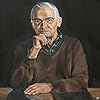Jason Howell
asked
Colm Herron:
In what ways does The Wake's Jeremiah Coffey bear resemblance to the author Colm Herron? And in what ways do those two personages differ?
Colm Herron
We’re like peas in a pod. Well, not quite I suppose. For a start, both he and I were certain that people who practised extramarital sex were bound for hell and those who practised it with bisexuals had an especially hot corner reserved for them. For Jeremiah, these rigidly held beliefs were severely tested when he fell in love with a charismatic bisexual girl called Aisling and began to sleep with her. So from then on every moment of his life quickly turned into a crumbling precipice that he could fall from anytime and end up, or rather down, among the damned.
However, what happened during the wake (of the title) and what came after caused him to look again at his absolute principles. It took Colm Herron a lot more time than Jeremiah to begin to question the sexual morality that we Catholics were taught in the Sixties and Seventies. Most Catholics then, men especially, thought of sex as both very desirable and very shameful. And it took Jeremiah quite a while to understand that, in genuine relationships, sex should not be a thing apart but rather a part of the thing called love. For Colm Herron it took much longer.
Added to this was the fact that Aisling was a fiery political activist and Jeremiah was anything but. In fact he was deeply cynical about the motivations of those with strongly held political convictions that he felt could bring bloody revolution and great misery. In short, he was both a pacifist and a conformist. But Aisling was an idealist whose commitment to personal freedom and civil rights in Ireland and abroad brought her into conflict with the state and Church authorities. I, the author, wavered between the two. And I still haven’t come to a conclusion about, for example, when violence is justified.
___________________
"Women and Freedom"
A new blog post that deals with themes from The Wake:
http://www.colmherronpublishing.com/#...
____________________
However, what happened during the wake (of the title) and what came after caused him to look again at his absolute principles. It took Colm Herron a lot more time than Jeremiah to begin to question the sexual morality that we Catholics were taught in the Sixties and Seventies. Most Catholics then, men especially, thought of sex as both very desirable and very shameful. And it took Jeremiah quite a while to understand that, in genuine relationships, sex should not be a thing apart but rather a part of the thing called love. For Colm Herron it took much longer.
Added to this was the fact that Aisling was a fiery political activist and Jeremiah was anything but. In fact he was deeply cynical about the motivations of those with strongly held political convictions that he felt could bring bloody revolution and great misery. In short, he was both a pacifist and a conformist. But Aisling was an idealist whose commitment to personal freedom and civil rights in Ireland and abroad brought her into conflict with the state and Church authorities. I, the author, wavered between the two. And I still haven’t come to a conclusion about, for example, when violence is justified.
___________________
"Women and Freedom"
A new blog post that deals with themes from The Wake:
http://www.colmherronpublishing.com/#...
____________________
More Answered Questions
Jason Howell
asked
Colm Herron:
The Wake is dedicated to your daughter, Nuala Herron (an exceptional artist in her own right). Was she around the same age as the Jeremiah character when you began writing the book? If so, was this an impetus at all? Do you think you could have written this novel before you were a parent?
About Goodreads Q&A
Ask and answer questions about books!
You can pose questions to the Goodreads community with Reader Q&A, or ask your favorite author a question with Ask the Author.
See Featured Authors Answering Questions
Learn more



